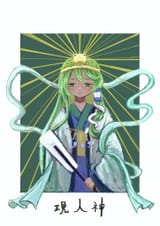>>50178554
>(Greeks, and Romans, did end up abstracting further and further as an adaptation)
If you're referencing the neoplatonists, they're arguably of a different civilization. This is evident from their different treatment of death, their further veering into abstraction, and their different treatment of ritual(specifically the emergence of Iamblichan theurgy, which is arguably closer to the Early Christian and even Muslim conception of worship than to the Greek view of religious ritual). Classical and Middle Platonism treated the forms as concrete and "bound," reflecting their view of the world they believed emerges from them, whereas neoplatonists increasingly saw them as apophatic principles, moving from the Form-Representation dichotomy that characterized nearly all Classical philosophy(with the sole exceptions of Democritus; even the Epicureans acknowledged concepts, although they explained them as mental images rather than as occupying a separate realm) to the Essence-Attribute dichotomy.
This also makes sense in the historical context, since Classical civilization was entering its death stage(evident from the general turn from cultural innovation to analysis, the turn from metaphysics to politics, the emergence of power politics(brute force was a political factor in Greece, like we see with the Athenian revolution, but the mid-to-late Roman state, starting with the late Republic, in which a political position was only held as long as someone else didn't kill you for it, is fundamentally different), the appearance of a universal state(which might not seem like a sign of decline, but was a predictor of impending cultural death in Egypt, Sumer-Babylon, India, China, the Levantine civilization which I argue Plotinus was an early representative of, and Mesoamerica), the decline of art and the turn to imitation rather than innovation, declining birthrates etc.) long before Plotinus, so that dying civilization going back to philosophy, which, in all cases, appears in the first half of civilizational life, would be anomalous.
>but any Greek thinker you'd single out is always at least a borderline pariah deviant within the actual religious and cultural norms
Even if you try to approach this from as traditionalist pagan of a perspective as possible, the only example I can think of being The Clouds by Aristophanes, you get even more of an aversion to conceptual abstraction.
Thing is, Homeric paganism, the tragic poetical tradition, the Sophists, and all Classical philosophical traditions came from the same civilization and thus share that civilization's worldview. In the same way that the brahmanic tradition, Buddhism, and Charvaka were historically opposed, yet we can see that they arose from the same worldview, since they are more similar to each other in general outlook(although they might be more similar to the external philosophies on certain particularities) than they are to Homeric paganism, Stoicism and Epicureanism, their Classical equivalents. In that same sense, Descartes, Voltaire, and Hegel, although they diverged from the Christianity of the Middle Ages, when Western civilization was born, still share its worldview and were centered on a common unique dichotomy distinct to the Form-Representation and Essence-Attribute ones.
>The pagans would have inevitably come to boundless reconceptualizations
There is nothing to suggest that. Chinese and Indian civilizations have existed for ~3000 years and haven't, on their own, developed a concrete concept of infinity.
Certain concepts are tied to certain civilizations. For instance, the concept of 0 has only been discovered once, in India. You can see how the Indian conception of the world led to this mathematical innovation. While mathematics are more easily communicable than other civilizational technics, their discovery is still unique. The culture that discovered Euclidian geometry could not have discovered Calculus or Algebra.
You didn't add the "Sanae cute" part.
This discussion very much relates to Sanae. She is very much a manifestation of Japan, you could almost see her, in her divine function, as representing the Japanese spirit, characterized by the proto-cultures that created that culture and by that culture's geography, while in her human function, she represents the various technics, Chinese and Western, Japan has adopted over the ages.
Sanae cute




